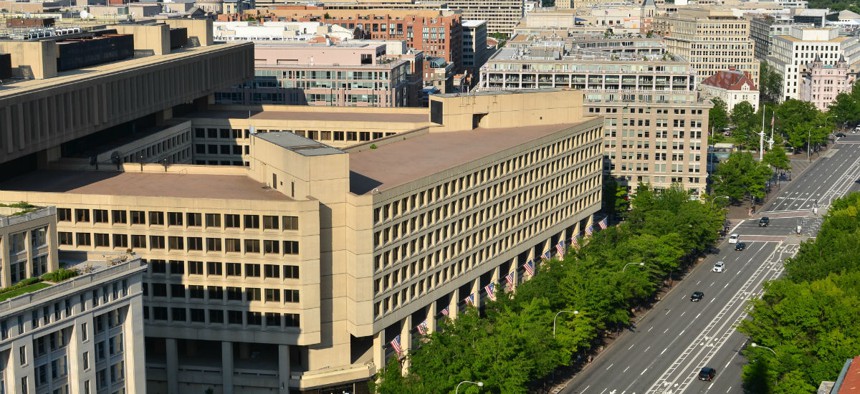
The overcrowded and outdated J. Edgar Hoover Building on Pennsylvania Ave. is home to the FBI. Shutterstock.com
How The FBI Could Get a New Headquarters
If Congress isn’t willing to pay for federal infrastructure, it should at at least make sure the rules allow GSA to secure the best deal for taxpayers.
Imagine you live in a dilapidated home your family has outgrown. While you don’t have the cash to remodel and expand, the upside is it is located on a prime piece of real estate. Local homebuilders are willing to make a deal: swap your land for another property and they will help offset some of the cost of your new home.
This is exactly the situation the FBI is in with respect to its crumbling headquarters building on Pennsylvania Avenue, blocks from the White House. Yet after a decade of the government pursuing a deal to swap the FBI’s prime real estate for a major portion of the cost of a new, more secure building in Virginia or Maryland, the Trump administration announced that it was calling off the process. It seems the FBI has been hit by outdated federal accounting and budget rules that often stack the deck against commonsense solutions.
Consider the plight of another federal agency, the Transportation Department. By the late 1990s, Transportation’s personnel had outgrown its dated headquarters forcing agency operations into offices scattered across the Washington region. The government’s landlord, the General Services Administration, solved the department’s problem by selling government land near what is today Nationals Park to a private company in exchange for the private company building a new headquarters that the government agreed to lease for 15 years.
At the end of 15 years—in 2021—the government has the option of renewing the lease at fair market rates or purchasing the building at fair market value. With the Washington Nationals and many new residential and commercial buildings as neighbors, Transportation’s headquarters is worth a lot more than it was 10 years ago. Yet, because the department’s lease is an operating lease at the end of the 15 years it will have zero equity in its headquarters.
Given that the government pays the Transportation Department’s landlord approximately $50 million a year in rent, taxpayers would be justified in wondering why the government didn’t get a better deal. Why didn’t the government sign a lease-to-own agreement so taxpayers would have something to show for all those lease payments?
Turns out the answer is government red tape.
An obscure document—the Office of Management and Budget’s Circular A-11—sets the budgetary rules for federal property. If a federal agency wishes to simply lease an office building it needs only to secure annual appropriations for the annual cost of the lease. If, however, the lease ultimately results in government ownership of the property (i.e., lease-purchase agreements) the agency must account for all the costs up-front and secure the total appropriations in the first year.
Which do you think is easier: convincing Congress to give you $50 million a year indefinitely or $325 million (the cost of constructing the DOT headquarters) in one year?
As the FBI learned by its inability to secure full initial year funding for a new headquarters, the answer is it is always harder to get one big check from Congress than it is a lot of “little” checks.
As a result, the FBI’s story—once GSA figures out a new solution for the crumbling headquarters—could end up being the same as DOT’s: years and years of multi-million dollar lease payments with nothing to show for it at the end of the day. That is why it is time to revisit the government’s budgetary rules for federal property.
If Congress and the administration are not willing to provide the upfront funds for modernizing federal infrastructure, they should at a minimum make sure the rules work to give GSA the flexibility to secure the best deal for taxpayers, including through public-private partnerships. The rules should not disadvantage lease-to-own agreements.
The Trump administration is rightly focused on removing barriers to private investment in public infrastructure. Let’s hope that includes the buildings federal agencies call home.
Eric Cantor served as House Majority Leader during the 112th Congress. He is a member of the Bipartisan Policy Center’s Executive Council on Infrastructure.
NEXT STORY: How Trump’s White House Shakeup Will Affect DHS






